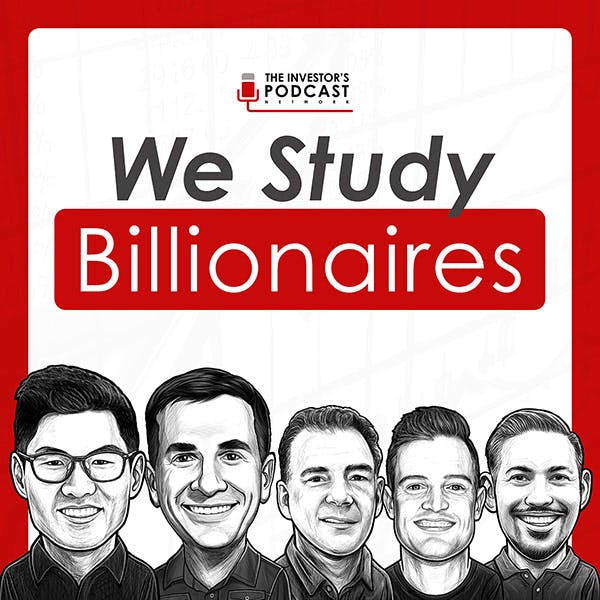
December 15, 2024 • 1hr 14min
TIP683: The Evolution of a Legend: Lessons from Charlie Munger’s Life and Investments w/ Kyle Grieve
We Study Billionaires - The Investor’s Podcast Network

Key Takeaways
- Charlie Munger's core principles included integrity, independent thinking, focus on quality businesses, and doing the right thing even when it wasn't profitable
- Key investing lessons: Concentrate when odds are favorable, be patient waiting for opportunities, avoid leverage, focus on businesses that make decisions easy
- Business philosophy: Good businesses consistently throw up easy decisions while bad businesses require constant painful choices
- Personal traits: Intense focus, rational thinking despite emotional personality, willingness to be subordinate when appropriate
- Career evolution: Moved from law to real estate to investing partnerships to Berkshire Hathaway, learning key lessons at each stage
Introduction
This episode explores Charlie Munger's life and career through insights from Janet Lowe's biography "D**n Right!". Host Kyle Grieve examines how Munger's early experiences and values shaped his investment philosophy and business approach. The discussion covers Munger's similarities to Benjamin Graham, his partnership with Warren Buffett, and the key lessons from his various business ventures.
Topics Discussed
Similarities Between Munger and Benjamin Graham (3:25)
Despite being known for helping Buffett move beyond Graham's strict value investing approach, Munger shared important traits with Graham:
- Academic mindset - Both took scholarly approaches to investing and had broad intellectual interests
- High intelligence - Graham graduated Columbia at 19, Munger scored exceptionally high on Army IQ tests
- Independent thinking - Both valued forming their own conclusions rather than following others
- Focus on objectivity and realism in analysis
The Power of Focused Thinking (13:08)
Munger developed a powerful habit of dedicated thinking time:
- Sold himself the best hour of each day to improve his mind
- Intense concentration - Could focus so deeply that he ignored social conventions
- Multi-disciplinary approach - Drew insights from physics, psychology, and other fields
- Used this time for reflection and problem-solving
Learning from Missed Opportunities (14:36)
The Belridge Oil investment highlighted important lessons about seizing opportunities:
- Initial investment of 300 shares at $115 each proved highly profitable
- Missed opportunity to buy additional 1,500 shares due to insufficient funds
- Stock rose to $3,665 per share within 18 months
- Key lesson: "Don't be timid with a sure opportunity and go at life with courage and gumption"
Lessons from Legal Career (25:22)
Munger's experience practicing law shaped his business philosophy:
- Client selection - Preferred working with ethical clients even if less profitable
- Value of independence - Left law to make his own investment decisions
- Importance of integrity - Maintained high ethical standards throughout career
- Developed meritocratic compensation systems that rewarded performance
Investment Partnership Insights (32:15)
Wheeler, Munger & Company provided valuable experience:
- Strong performance - 37.1% annual returns from 1962-1969
- Concentration risk - Suffered in 1973-74 bear market due to concentrated positions
- Managing outside money - Found it harder than managing personal investments
- Learned importance of quality over pure value investing
The Power of Independent Thinking (33:13)
Munger emphasized forming independent judgments:
- Listening to experts but reaching own conclusions
- Avoiding groupthink and popular opinions
- Developing conviction through deep research
- Maintaining rational thinking despite emotional personality
Concentrated Portfolio Management (42:22)
Munger's approach to portfolio concentration revealed key insights:
- Higher volatility but potential for superior returns
- Requires deep knowledge of holdings
- Need strong conviction to weather downturns
- Not suitable for most investors due to psychological demands
Quality Business Advantages (53:21)
See's Candies taught crucial lessons about business quality:
- Easy decisions vs painful choices in management
- Power of brand and pricing power
- Benefits of low capital requirements
- More enjoyable and less stressful to own
Berkshire's Lack of Master Plan (1:00:55)
The absence of a rigid strategy proved advantageous:
- Pure opportunism in seeking investments
- Flexibility to pursue attractive opportunities
- Avoided empire-building mentality
- Focus on creating shareholder value rather than size
Capital Allocation Philosophy (1:03:20)
Munger's approach to capital allocation was straightforward:
- Simple test: Each dollar retained should create more than a dollar of market value
- Long-term perspective on value creation
- Willingness to hold cash when opportunities scarce
- Focus on favorable odds rather than avoiding volatility
Conclusion
Charlie Munger's life and career offer valuable lessons for investors and business leaders. His emphasis on independent thinking, focus on quality, and commitment to ethical behavior created lasting value. While his concentrated investment approach may not suit everyone, his principles of patience, rationality, and seizing clear opportunities remain widely applicable. Perhaps most importantly, his example shows how combining strong principles with continuous learning can lead to extraordinary success.









